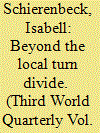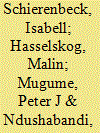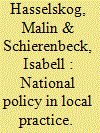|
|
|
Sort Order |
|
|
|
Items / Page
|
|
|
|
|
|
|
| Srl | Item |
| 1 |
ID:
139239


|
|
|
|
|
| Summary/Abstract |
This article builds on the contributions to this special issue by examining different approaches to the local turn and what can be learnt from applying them. The contributors agree on the imperative of understanding ‘the local’ in peacebuilding; however, there seems to be a multitude of ways forward in this regard. The immediate concern is how this acknowledgement translates into practices that allow for both efficiency and local emancipation in the building of peace. The article suggests giving up the ‘one-size-fits-all’ model of peacebuilding and engaging in context-based methods and research designs beyond generalisations. One way to go about this is to strive for interdisciplinary research – combining peace studies and political science with social anthropologists and area studies – but also to involve ‘the locals’ themselves in the process of taking a few methodological steps further.
|
|
|
|
|
|
|
|
|
|
|
|
|
|
|
|
| 2 |
ID:
153142


|
|
|
|
|
| Summary/Abstract |
A paradox in current international development cooperation is comprised by the simultaneous insistence on national ownership and far-reaching donor involvement through policy dialogue. In order to better understand this combination of a strong ownership ideal and extensive donor presence, this article explores how national and external actors portray the process of formulating and revising development policies and programmes in an aid recipient country. The study is based on original empirical material from national as well as external actors involved in the aid relation in Rwanda which, despite heavy aid dependence, is known to have achieved relative policy independence. Analysed in relation to three strands of critical thought in previous research, findings show that, in Rwanda, the very top political leadership is actively involved in initiating and formulating policies; that there are instances of negotiation as well as strong disagreements between national and external actors; and that, rather than donors seeking to retain control, Rwanda is depicted as setting its own agenda and effectively managing its donors. The paradox of an ownership ideal combined with donor involvement is thus met by an apparent tendency among national as well as external actors to emphasise national ownership while toning down donor influence.
|
|
|
|
|
|
|
|
|
|
|
|
|
|
|
|
| 3 |
ID:
139235


|
|
|
|
|
| Summary/Abstract |
Far reaching decentralisation reform has been launched in Rwanda, intended to contribute to socioeconomic development as well as to reconstruction and reconciliation. While the reform is well in line with the international trend of a ‘local turn’, the Rwandan government makes a point of not letting donors or other external actors set the agenda. Determined to formulate its own policies, thus claiming ‘national ownership’, it has, within the frame of decentralisation, launched several development programmes to be locally implemented and to promote local participation and downward accountability. However, the reform and programmes are designed and decided upon in a top-down manner by the central national leadership. This article analyses local experiences and perceptions of decentralisation and related programmes, and investigates whether and how such reform provides for local participation and downward accountability. It concludes that nationally owned reform is not necessarily an alternative to externally initiated and driven reform; neither local participation nor downward accountability was enhanced. The study builds on official policy documents and semi-structured interviews with Rwandan residents and local officials.
|
|
|
|
|
|
|
|
|
|
|
|
|
|
|
|
| 4 |
ID:
185163


|
|
|
|
|
| Summary/Abstract |
In spite of a vibrant debate about the genesis, logic and effects of peace operations, peace research remains poorly equipped to account for how policies are implemented and ‘translated into practice’ – issues that have been the focus in implementation studies for nearly five decades. In response, we propose a merger of certain strands of peace research with bottom-up implementation studies, which forefronts the role of ‘implementing actors’, namely, those actors who are granted the discretionary powers to carry out policies in their daily encounter with local counterparts on the ground. Through a case study of peace operations in the Democratic Republic of the Congo (DRC), we show that successful policy implementation depends on that field-based implementing actors are provided with discretionary powers to use their skill, judgement and local knowledge to solve problems and ensure implementation of peace operations on the ground. There is a need for a paradigm change within peace research in order to account for these findings. Better understanding of the daily work carried out by implementing actors in the field makes it possible to avoid many of the pitfalls and shortcomings we have witnessed through several decades of flawed or even devastating peace operations such as the one in DRC.
|
|
|
|
|
|
|
|
|
|
|
|
|
|
|
|
|
|
|
|
|